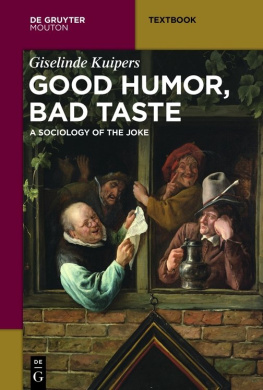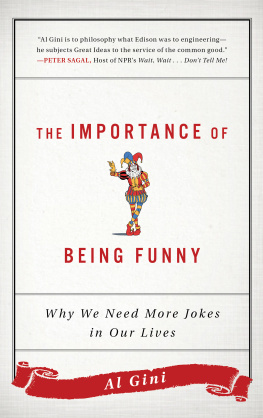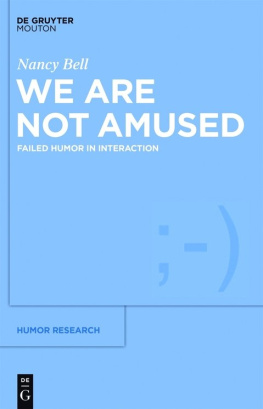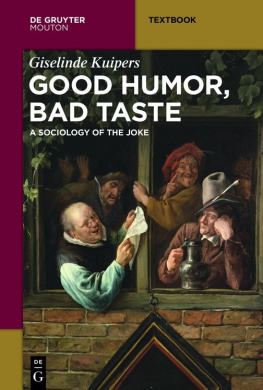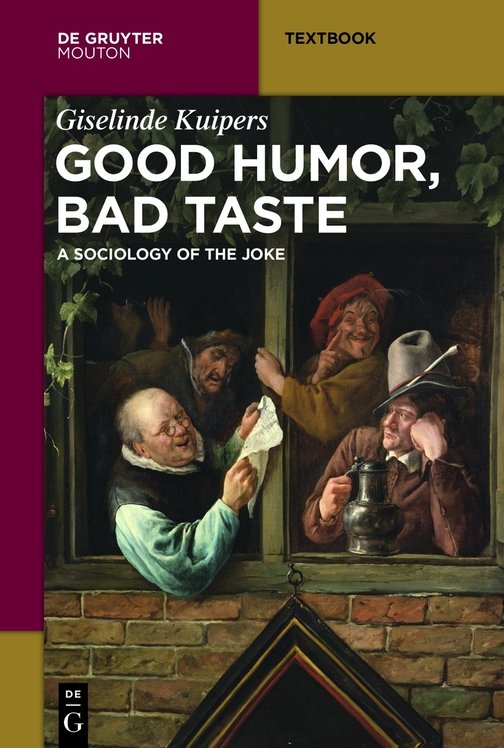Acknowledgments
Many people have contributed, both directly and indirectly, to this book. I am very grateful to all the people who agreed to be interviewed by me, or to participate in the survey. The research would have been impossible without their willingness, and enthusiasm, to indulge my rather bizarre request: to discuss their sense of humor with me.
Joop Goudsblom, my advisor, or promotor as it is so aptly called in Dutch, has been a great help and inspiration to me ever since I started my life in Academia. I hope that some of this dedication and attention to clear writing and clear thinking shows in this book.
Most of the research was conducted while I was at the Amsterdam School for Social Science Research at the University of Amsterdam. I look back on my years at the School fondly and with nostalgia, both for its sociable atmosphere and its wonderfully stimulating intellectual climate. I owe a great debt to the many people at the ASSR with whom I discussed my ideas and who read (parts of) the book: Erik Bahre, Marieke Bloembergen, Talja Blokland, Jaap Dronkers, Bart van Heerikhuizen, Marcel Hoogenboom, Dienke Hondius, Bowen Paulle, Jan Rupp, Bert Schijf, Abram de Swaan, Jo Swabe, Bonno Thoden van Velzen, Jojada Verrips, Frank Wiendels, and Nico Wilterdink. I am also very grateful to Jeffrey Goldstein, Theo Meder and Cas Wouters; and to Christie Davies, Jessica Milner Davis and Victor Raskin for support from overseas.
The research in the United States was made possibly by a Talent Grant from the Netherlands Organization for Scientific Research (NWO), for which I am very grateful. NWO also generously funded the translation of the Dutch chapters. I want to thank Jeroen Jansz, Peter Neijens, and Patti Valkenburg at the Amsterdam School for Communications Research for their help in securing the Talent Grant and for enabling to me leave for a year.
At the University of Pennsylvania, I have enjoyed the hospitality of the Annenberg School of Communication and the Department of Sociology. I want to thank the many people at Penn who helped and welcomed me in Philadelphia: Elijah Anderson, Vida Bajc, Jennifer Beer, Randall Collins, David Grazian, Jerome Hodos, Kathleen Hall Jamieson, Amy Jordan, Ross Koppel, Jenn Larimer, Daniel Maman, and Erika Summers-Effler. I also want to thank Salvatore Attardo and Victor Wan-Tatah for their help in arranging interviews in Youngstown, Ohio.
In the writing of the American chapter, I have benefited greatly from the many discussions about cultural differences and cross-national comparisons with my colleagues at Erasmus University: Pauwke Berkers, Susanne Janssen, Alex van Venrooij and Marc Verboord.
I am grateful to the editors of Moppentoppers at Endemol Studios, who allowed me to participate in the selection, where I recruited many of my interviewees. I also want to thank Reid, Geleijnse and van Tol for letting me use their Fokke and Sukke cartoons, in the survey and again in this book. Patrick Chapatte was very generous in letting me use his cartoons in the survey.
I want to thank Emily Farrell and Lara Wysong at De Gruyter for making possible this second revised edition. Also, I am very grateful to Will Noonan for his thorough, careful editing.
Finally, I want to thank all my friends and family for their support, company and good humor. Three of them deserve special mention, both for being wonderful friends, and for their contribution to this book. When Suzanne Kuik and I started our PhD research, we shared not just and office, but also our ideas, doubts and enthusiasm. I am grateful that the sharing of ideas, doubts, and enthusiasms continued until long after the ending of our PhD trajectories. I also want to thank Jeroen de Kloet for our ongoing conversations from either side of the post/modern divide, on the vicissitudes of life, academic and otherwise. Our conversations have grown increasingly nomadic over time, yet they always feel close. Finally, Peter Zuithoff not only was an indispensible help because of his statistical knowledge, but also has been the most loyal of friends throughout the years.
As its previous incarnations, this edition of this book, too is dedicated to my sisters: to Margit, whose sense of humor I have seen develop over the years with a mixture of sisterly and scholarly interest; and to Wendelmoet, who is always the first, and sometimes the only one, to laugh at my jokes.
Appendix 1
The jokes used in the Dutch survey
- Trevors nails
This advertising man gets to make an advertisement for Trevors Nail Factory. A week later he visits the factorys managing director, carrying a large roll of paper with him. He rolls it out and theres an image of Jesus on the cross, with the following text underneath: Thanks to the nails from Trevor, Ive been hanging here forever. The managing director is aghast and says: We couldnt accept that, sir. No, we just couldnt. Have another try, without Jesus on the cross.
A week later, the advertising man returns, carrying a large roll of paper with him. This time theres an image of Jesus lying face down in the dirt under the cross, with the following text: NOW IM FLAT ON MY FACE. WITH TREVORS NAILS ID STILL BE IN PLACE.
- Moos in restaurant
To his own surprise, Moos has already been working for a few weeks as a waiter in a restaurant. One day a client calls out to him: Waiter! What a small steak! Last time I was here, it was a whole lot bigger. Sir, says Moos, thats an optical illusion. Since you were last here, the restaurants been rebuilt and its much larger now.
- Last names (see also note 31)
Madonna doesnt have one; the pope has one but doesnt use it. Bush has a short one and Wolfowitz a long one. What is it? A last name.
- German and Jeuv
A German and a Jew are standing at the side of the water wondering if theyll take a swim. The German sticks his elbow into the water and says: Brrr, too cold for me. The Jew then sticks his nose in and says: Its not just cold; its really deep too!
- Flood
Theres been a huge flood. The water is still rising. All the people have fled to the roofs. After a while, a boat comes along with rescue workers who pull everyone off the roof. Only the priest refuses to go. He says: God will save me. The rescue workers try to convince him but he stubbornly insists, saying: God will save me. So the boat drifts away with everyone in the village on it except the priest.
After a while another boat comes along. The water has meanwhile risen even further; the priest is in it up to his waist. But he still doesnt want to go, saying: God will save me.
Still later, the priest is standing on the roof of the house up to his neck in water. A helicopter arrives overhead and through the megaphone a voice says: Father, weve come to save you! Youve been saved! But the priest refuses to go with them, saying: God will save me. The water rises and rises, the house disappears under water and finally the priest disappears too.
At the heavenly gates, in a deeply offended voice, the priest says to Saint Peter: I was so sure God would save me. Peter, who doesnt understand it either, answers: Indeed sir, you have lived a life beyond reproach. You had every reason to expect to be saved. So he sends the priest through to the big boss. The priest stands in front of Gods throne asking: Why didnt you save me while I was standing on that roof waiting? God says: You know, I dont understand it either. Something mustve gone wrong. I personally sent two boats and a helicopter to get you.
- Skeletons

